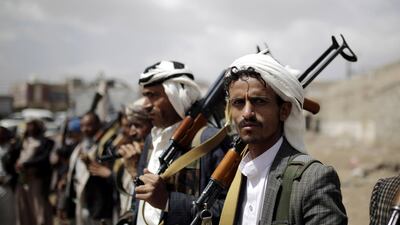Houthi rebels must immediately release 10 Yemeni journalists held for false charges, Amnesty International said on Wednesday.
Yemen was plunged into a civil war in 2014 after the Iranian-backed group seized its capital, Sanaa, and ousted the internationally recognised government from power.
The journalists have been in Houthi detention since 2015 and were formally charged in December 2018 with multiple offenses including spying and aiding the Arab-led coalition that has been attempting to restore the government of President Abdrabu Mansur Hadi, the human rights organisation said in a statement.
The men could face the death penalty.
“It is completely outrageous that these men could face the death penalty simply for doing their jobs. The charges against them are false and should be dropped immediately,” Rasha Mohamed, Amnesty’s Yemen researcher, said in a statement.
Over the course of their detention they have been forcibly disappeared, held in intermittent incommunicado detention, been deprived of access to medical care and suffered torture and other ill-treatment, Amnesty said in a statement.
Some of the journalists worked for online news outlets affiliated with Al Islah, a political party that opposes the rebels' operations, the organisation said.
“These men are punished for peacefully exercising their right to freedom of expression. The de facto Huthi authorities should release them immediately and drop all the charges against them,” Ms Mohamed said.
Their trials have not started yet and it is not clear when they might take place, Amnesty said.
"Journalists must be allowed to carry out their work free from harassment, intimidation or threat of arbitrary arrest, prolonged detention or prosecution," she said.
Officials in the Yemeni government say that violations against journalists is not a new phenomenon.
The rebels have committed over 700 violations against reporters and members of the media since the start of the coup, Yemen's Deputy Human Rights Minister Majed Fadhil told The National.
"We have recorded over 21 murder cases, 150 cases of arbitrary kidnappings and enforced disappearances amounted to an extra 150 cases of journalists," Mr Fadhil said.
The government will continue to pressure the rebels to release the detainees, he said.
"This is a flagrant violation of international humanitarian law and all humanitarian principles and norms," the official said.
Nine of the journalists were arrested in a single raid on the Qasr Al Ahlam hotel in Sanaa in 2015, the tenth journalist, was detained at his home in Sanaa by Houthi forces also in the same year.
The men are believed to be in poor health, according to their family members.
“They are believed to suffer from a range of health problems, including abdominal pain, for which they have been refused treatment. Officials in the Political Security Office have also prevented visiting families from bringing detainees medication,” the organisation said.
Family members also told Amnesty that their prison visits were irregular, did not last more than five minutes and were heavily supervised by armed men, in an effort to intimidate the detainees from speaking out, they said.
Houthi forces have arbitrarily arrested and detained critics and opponents as well as journalists, human rights defenders and members of the Baha'i community.
The rebels have arrested and charged dozens of Baha’is. Last year, 24 Baha’is were accused of apostasy and espionage in a Sanaa court. Five of them are being held in prison.
The Baha'i movement dates back to 1844 and considers itself a universal religion that embraces kindness and peace and promotes religious tolerance and women's empowerment.


